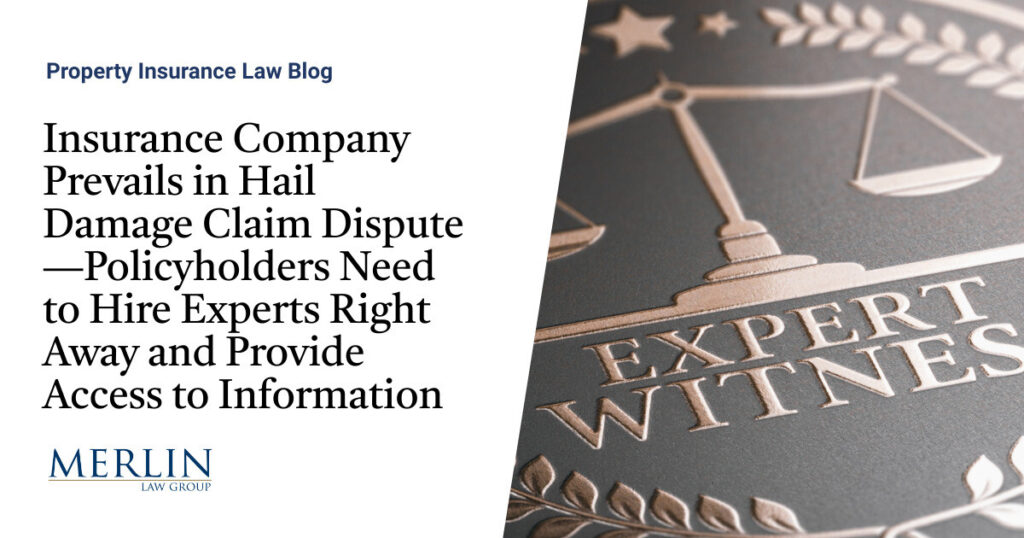Insurance Company Prevails in Hail Damage Claim Dispute—Policyholders Need to Hire Experts Right Away and Provide Access to Information

A recent federal court ruling in Missouri highlights the critical importance of admissible expert testimony in property insurance disputes. In a case involving alleged hail damage to a commercial building, the court granted summary judgment in favor of the insurer, Charter Oak Fire Insurance Company, after excluding the policyholder’s expert witness. 1
The policyholder, BLIV, Inc., reported wind/hail damage from a storm on July 9, 2021, to their commercial property in St. Louis, Missouri. Charter Oak inspected the property and estimated covered damages at $774.57 – below the policy’s $2,500 deductible. It was interesting to me that the initial “representatives” for the inspection were Ladder Assist and the roofing contractor.
Following the initial inspection, the insurer hired an engineer, Isaac Gaetz, who concluded that (1) the roof and insulation were not damaged by hail from the July 2021 storm, (2) damage was caused by long-term water intrusion, and (3) no hail-caused penetrations or tears were found in the roof membrane. Based on these inspections, Charter Oak denied the claim beyond the minor damages found, citing policy exclusions for wear and tear, deterioration, and inadequate maintenance.
Several months later, the policyholder demanded $2.68 million for alleged interior and exterior storm damages. Suit was filed, and the original insurance coverage attorneys were from McClenny, Moseley & Associates, who I have discussed in McClenny, Moseley & Associates, aka MMA, Files Bankruptcy: Texas Lawyers Involved With Mass Hurricane Advertising Scheme Seek Reorganization. Those attorneys apparently did not hire engineering experts before filing the lawsuit to opine that damage was caused by hail.
In a Daubert Motion to Exclude Expert Reports, the insurance company attacked the opinion of the expert, Brian Johnson, who subsequent attorneys for the policyholder had eventually retained. Mr. Johnson did not inspect the property until May 30, 2023, almost two years after the alleged storm event in July 2021.
He did not conduct any interior inspection of the building. He did not interview the building owner or employees. He did not review any property maintenance records from before or after the event. Charter Oak further noted that Johnson did not observe any hail punctures, fractures, or storm-created openings on the roof during his inspection. Johnson relied on “marketing materials” from a manufacturer to conclude that fiberboard is more susceptible to hail damage without verifying this through independent testing or literature.
Johnson also ruled out failed seams or flashings as a cause of damage without reviewing a key document (Vertex Supplement) that identified roof penetrations caused by failed seams/flashings. The insurer noted that Johnson could not definitively state whether moisture staining predated the July 2021 storm and that he did not conduct moisture testing or other independent analysis to confirm his theories.
The court agreed with the insurer and excluded the testimony of the policyholder’s expert, finding his opinions were not based on sufficient facts or reliable methods. This left the policyholder without admissible expert evidence to counter the insurer’s findings.
The court found the policyholder failed to provide admissible evidence that the hailstorm or other covered peril caused the loss. The minimal hail damage ($774.57) was less than the policy’s $2,500 deductible. Without a valid breach of contract claim, the vexatious refusal to pay the claim was also lost.
What are the key lessons from this case?
Expert testimony is crucial in many hailstorm and windstorm claims. Having a qualified expert who can withstand Daubert challenges is often make-or-break in these cases.
Timely inspections matter: The policyholder’s expert didn’t inspect until nearly two years after the loss, which likely contributed to the court’s skepticism. Hire experts as soon as possible.
Policy language is key: The court relied heavily on policy exclusions for long-term water intrusion and wear and tear in its ruling. Those need to be addressed with facts and admissible expert opinion.
Hire the best attorneys you can with great reputations. Do not take the word from a public adjuster or a contractor. Policyholders need to do their own research.
Thought For The Day
If you think it’s expensive to hire a professional, wait until you hire an amateur.
—Red Adair
1 BLIV, Inc. v. Charter Oak Fire Ins. Co., No. 4:22-cv-869 (E.D. Mo. Sept. 23, 2024).







